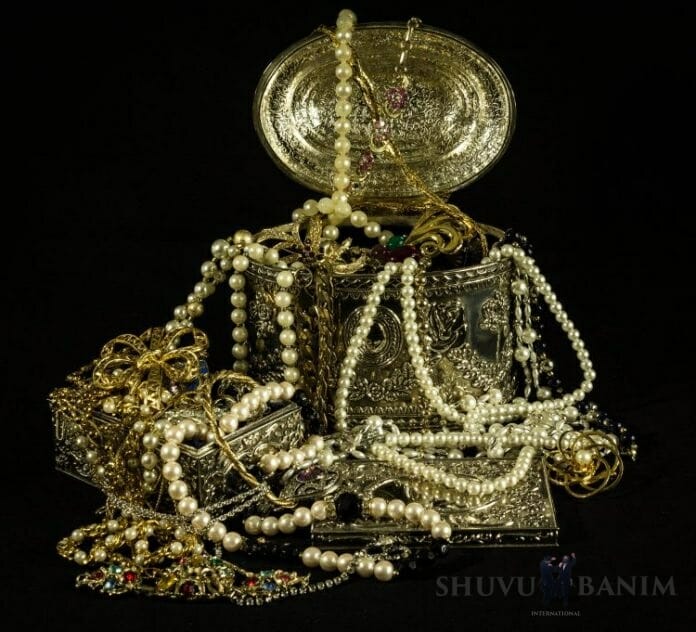Parshat Yitro: Money should be loathsome to us
More secrets of the Torah with Rav Eliezer Berland, shlita:
The Rebbe tells us in Lesson I:30:
“It’s impossible to perceive Godliness other than by way of many constrictions, from cause to effect, from a higher perception to a lower perception….But the only way to attain the lower concepts is by loathing financial gain – money should become absolutely loathsome.”
The whole world is run from the place of the lower intellect, and from a lower perception. A person who hates money merits to have this ‘lower perception’, this lower intellect, and then he can lead the world. This is when money becomes absolutely loathsome. The practical meaning of this is that he can lead the world.
King Solomon ruled over the whole world
King Solomon had this lower perception ‘he was wiser than any other person’. He ruled over the whole world. Because he hated money, he was King over the upper and lower realms. Everything that King Solomon achieved – he ruled over demons, over the eagles, over all the creatures, even that he built the Temple – everything was done via this lower perception, which is loathing money.
Because he hated kesef (silver / money), he had no end of money. All the kings came to him, and brought him silver and gold and monkeys and elephants – they brought everything to him, because he hated money and found it loathsome. As it’s written: “In the time of Solomon, silver was worthless.”
Spirituality is only revealed when we start to hate money
If a person wants to get to the place of this lower intellect, of this lower perception, to acquire a drop of intellect, a drop of wisdom, even in the revealed [Torah], this only comes if a person starts to hate money. If a person doesn’t hate money, he won’t manage to get to the more spiritual side of things.
The lust for money is abominable, it’s the hardest lust [to break] of them all.
It’s possible to escape from all other lusts. All other lusts are despised, a person feels ashamed [of his lust] and he’s held in contempt because of it, people shame him over it.
But the lust for money, this is the one single thing that a person feels absolutely no shame over – quite the opposite! He prides himself on the fact that he has money, and he becomes arrogant because of this.
No-one is ashamed of their lust for money
Rav Natan said about the lust for money “it beats a person many times”. Not only does a person fall into the lust for money, which is the biggest tumah (spiritual impurity) that exists in the world, but he’s also glorified for it, and praised over it, and everyone is jealous of him and runs after him.
And so, it’s very hard to get someone out of the lust for money. No-one knows how to get out of it. Every other lust is shameful, but this lust is the most terrible one of all. The lust for money is hidden and concealed from view, so there’s almost no chance that a person can escape from it. A person has no idea that it’s even a lust! He has no idea that even just thinking about money is contemptible.
Everything is decided before a person is born
He makes excuses for himself, like: “I need such and such a thing, I need to marry-off my children, I need to make a living.” What are you worrying about? Everything is announced in Shemayim (Heaven)! 40 days before a person is created, they’ve already agreed in Shemayim that on such and such a day, he’s going to get a house, and on this day he’s going to get a field, or parnassah (a living). Everything is decided before a person is even born!
For as long as a person is stuck in the lust for money, and thinks about it all day long, so the geula (redemption) can’t come, because the geula can only come when a person trusts in Hashem, and is yearning and anticipating for Hashem’s [help].
Everything comes at its right time
“The eyes of everyone are turned to You, and You will give them their food at its right time.” At its right time! Everything at its right time, at the time that it is meant to come to that person – an apartment, new furniture, etc, everything will be in its right time.
Really, a person’s regrets about money, all the thoughts he has about money, this only chases the miracles away. It chases his apartment away, it chases his parnassa away. His whole life, a person thinks about parnassa. He doesn’t know that at the very moment that he stops thinking about it, his parnassa will come to him, it will run to him.
What is ‘parnassa’? [In Hebrew, a par is a bull, and nosa means to drive away]. You run after the bull, the par, and it runs away, it escapes. If you’re chasing after parnassa, the parnassa will run away from you.
The story of the simple Jew’s horse and cart
It’s like the story about the simple Jew who heard a drasha from his rabbi about a blind, lame, injured bear who holed up in some cave, and a lamb would come along every day for him to eat, and would jump straight into his mouth. The Jew went home and said: “From this day forth, I’m not doing anything! From this day forth, I’m not going to work.”
His wife started to cry, his children started to cry, everyone started crying like it was Tisha B’Av. In the morning, they woke up and they saw that all their possessions had been stolen [in the night]. It wasn’t enough that he’d decided he wasn’t going to go to work anymore, now they’d also stolen his horse, and his cart!”
“You have terrible luck! You have bad mazal (destiny)! Look what you’ve done to us! The moment you decided not to go to work, they stole our horse and cart. Everything is your fault!
Why did you have to listen to that Rabbi?!
“Why did you have to go to that Rabbi’s drasha?! So, he told you about some bear, that some lamb jumped into its mouth. What, do you think you’re a bear?! You’re not a bear! You need to be a human being, a man, you need to go to work. You brought all these kitrugim (Heavenly accusations) against us. Now there’s no horse, and there’s no cart – there’s nothing!”
What really happened is that there was a thief who stole a few golden boxes from a church, and he needed a horse and cart [to transport them]. He piled everything up on the cart, and then set off for the heart of the forest, where he dug a pit three metres deep, which is where he wanted to bury all the golden boxes.
Suddenly, all the earth collapsed on him, and he was buried alive in the pit. All the gold boxes were still on the cart – 10 golden boxes, with all their decorations – gemstones, pearls, golden knobs. Everything was still on the cart, just covered over with some sort of material.
The horse returns home
The poor horse didn’t know what was happening, or where he’d been taken, or what they wanted from him. “Where’s my master?” he started to cry. So he started to head back home, and at this time in this Jew’s house, everyone was still just crying about their stolen horse and cart. And crying over their crazy Abba, who’d decided not to go out to work. Suddenly, they heard a noise by the gate. Something was knocking on the gate, something was struggling to get through the gate.
Everyone went outside, and they saw the horse and cart. Everyone exclaimed: “The horse came back!” What joy and happiness there was. Such joy and happiness! But, what’s going to be with the crazy Abba, who doesn’t want to go out to work anymore? They saw that the cart was covered with cloth, and they thought it must be full of potatoes, or carrots. Maybe the thief stored some vegetables on the cart that was past their sell-by date. What else could it be?
For sure, it was just some rotten potatoes… Suddenly, they see that the cart is full of gold and silver chests.
And so it is for each and everyone of us. This isn’t some story from a million years ago, this is a story that could happen every single day! If a person believes in Hashem, and trusts in Hashem, then the gold and silver will arrive directly to his home.
This is what the Rebbe wanted for his followers
The Rebbe desired this very much for us, that we would throw money around, and share our money out to tzedaka (charity), and that we shouldn’t accumulate money, and that we shouldn’t lust after it. He desired this, and yearned for it very much, that we would merit to act in this holy way, as the Baal Shem Tov did, and as the Noam Elimelech did. They both used to give away all their money every single day to tzedaka, and they didn’t leave any over from one day to the next.
But in one of his conversations in Chayei Moharan (55), the Rebbe said I don’t want you to get confused by this holy practice. I don’t want you to try to jump up to this level in one shot. Don’t give your money away immediately on the same day! If you have debts, pay them. If you received some money, pay your tithes, give your tzedaka.
Don’t leave your family hungry – and don’t worship money!
If you hold by the practice of giving a homesh (a fifth of your income to charity, instead of the usual 10%) that’s even more lofty – but don’t leave your wife and children hungry. But still know how to hate money, know how to loathe it, don’t turn money into some sort of ‘holy’ thing.
People think that money is the holiest thing in the world, and they say ‘holy, holy, holy’ about it, and devote themselves only to sanctifying it. Know, that money is the greatest tumah in the world, and we need to be ashamed of the fact that we think about money.
So, a person needs to follow this principle, and should be ready to have this desire to try to come to the level of the tzaddikim, when it comes to trusting in Hashem, and loathing money.
Money should be loathsome to you.
Translated from the Tzama Nafshi newsletter.

















